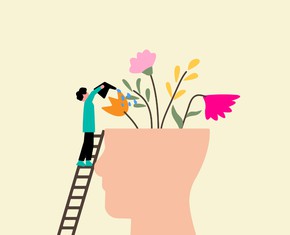The views expressed in our content reflect individual perspectives and do not represent the authoritative views of the Baha'i Faith.
I think we can all agree: the world needs less hypocrisy. We’d all be better off with less deception, bad faith and lip service.
But what about giving lip service to some high ideal, in the hope that others will follow it, even if I don’t practice it myself? Wouldn’t that be better than silence or open support for blameworthy behavior? Many people would be inclined to say “Yeah, let’s go for the lesser of two evils.”
I don’t know whether I agree with that idea or not. But I want to share some cautionary thoughts against saying yes, which have to do with the role of knowledge as a basis for deeds.
A few months ago I was thinking about writing a few essays about different ways that spirituality can contribute to the productivity and efficiency of a workplace. I thought a good starting point would be backbiting, the habit of talking about other people’s faults when they’re not around. I knew it would be relatively simple to write and that it would probably resonate with a lot of people’s personal experiences. There was just one problem—a big one: I am not very good about this in my own workplace. This was especially true, I realized, at the time I had the idea of writing my essay.
Maybe my growing awareness that I personally had a problem was what inspired my thinking about the essay. That’s possible, and I suppose I could have written about my own personal struggle. But why write about it, if I didn’t have positive results to speak of? I considered the case for enlightened hypocrisy, outlined above, but it didn’t persuade me. I figured I better put that energy into backbiting less about my co-workers, than blasting something hypocritical out onto the web. So I kept my mouth shut and didn’t think about it for awhile.
Then recently I did some thinking about other things, and those thoughts led me back to the original dilemma. This quote from the Baha’i teachings lays out the basics for what I had on my mind:
Thoughts may be divided into two classes:
(1st) Thought that belongs to the world of thought alone.
(2nd) Thought that expresses itself in action.
It’s wise to separate these two classes of thought, not just because they take two different forms, but also because they hold separate content—our conscious thoughts differ from our unconscious thoughts. While we express our conscious thoughts openly and clearly in our minds, words, and actions; our unconscious thoughts are harder to pin down. We’re not always aware of them, and they can shape what we say and do without showing their faces.
As you can see, the distinction Abdu’l-Baha explains is not the distinction between the conscious and unconscious minds—but that second distinction he makes does help illustrate some important aspects of what he explains.
Baha’u’llah said that backbiting “quencheth the light of the heart, and extinguisheth the life of the soul.” Consciously, I know that and I can explain what it means. But if I continue to backbite anyway, that means the unconscious part of my mind, which influences my words and actions, doesn’t really understand Baha’u’llah’s admonition. Looking back, I think that was why I made the right choice to not write about backbiting in the workplace at the time—because I didn’t really understand it in a practical sense anyway. Since I wasn’t acting on the knowledge I had, I knew it needed to penetrate more deeply into my unconscious mind.
We act based on our understanding of any given situation. We do things for definite reasons—but one thing that makes humans so perplexing is we believe we think one way, but our actions show that we think another way. This creates a set of knotty challenges for anyone trying to positively influence someone else. If we speak to people only in words and conscious ideas, the message doesn’t necessarily sink in. The language of deeds resonates at a much deeper level.
Consider an analogy: imagine that you want to have a conversation with someone very powerful. If you merely have a conversation with her publicist, the message you want to send might not get through. After all, you don’t know if she listens to her publicist, and certainly, it’s not the publicist who makes the big decisions. You’re more likely to influence her if you can talk to her face-to-face. Now, think of that publicist as your conscious mind, and that powerful person as the deeper, harder-to-reach section of your mind, where your real thoughts reside and your actions originate.
Actions speak louder than words, because actions speak the same language as that inner part of us that most strongly influences our actions. They concretely demonstrate some definite piece of knowledge about how to act. That idea is a portion of the wisdom behind this memorable passage from Baha’u’llah’s writings:
O son of my handmaid! Guidance hath ever been given by words, and now it is given by deeds. Everyone must show forth deeds that are pure and holy, for words are the property of all alike, whereas such deeds as these belong only to Our loved ones. Strive then with heart and soul to distinguish yourselves by your deeds. In this wise We counsel you in this holy and resplendent tablet.
This food for thought reminded me how important it is for our words to be filtered through the experience of deeds—and it makes me think that I’ve still got some work to do on my relationships with my co-workers.
You May Also Like
Comments

















Long ago I had the unhappy experience of being slandered to such a degree in the work-place that my whole life spun out of control because of it. Being at the center of so many lies was the ...most hurtful experience of my life. So I am very sensitive to lying.
Baha'u'llah said, "True loss is for him whose days have been spent in utter ignorance of his self." When we learn to stop lying to ourselves true change can happen.